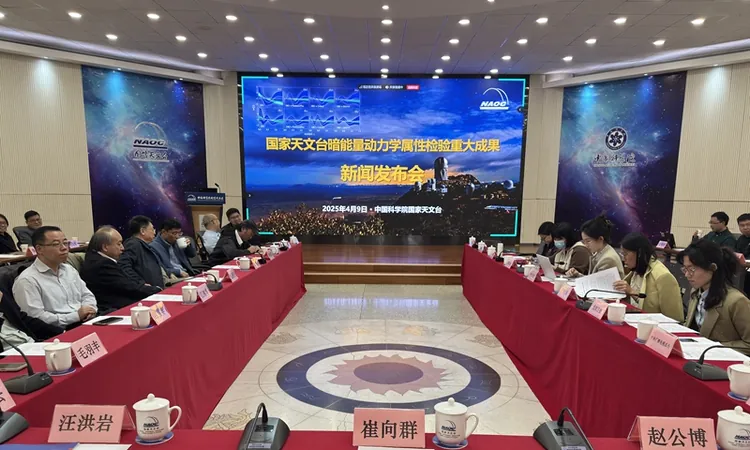
China's Bold Breakthrough in Dark Energy Research: New Discoveries Await!
2025-04-09
Author: Ming
A Groundbreaking Announcement in Cosmology
In a thrilling press conference held in Beijing on April 9, 2025, China's National Astronomical Observatories (NAOC) unveiled a monumental scientific advancement in the quest to unravel the enigma of dark energy. This breakthrough could reshape our understanding of one of the biggest mysteries in modern physics.
Unlocking the Universe's Secrets
Researchers assert that this new discovery lends crucial insights into the physical mechanisms behind the universe's accelerating expansion, hinting at the potential existence of new physics that challenges the established cosmological model.
Pioneering Tools: The Dark Energy Spectroscopic Instrument (DESI)
Central to this exploration is the Dark Energy Spectroscopic Instrument (DESI), a leading global initiative involving over 70 research institutions that embark on an ambitious quest to map the cosmos. Utilizing a cutting-edge 4-meter optical telescope, DESI performs high-precision measurements on millions of celestial objects, constructing a comprehensive 3D map of the universe’s large-scale structures.
A Decade of Dedication
For over ten years, teams led by researchers Zhao Gongbo and Zou Hu from NAOC have been integral to the DESI project. Zhao's team has developed innovative analytical techniques to study dark energy's properties, while Zou's contributions have enriched star catalogs that fuel new discoveries.
Confronting the Mysteries of Dark Energy
Since the late 1990s, when the universe’s accelerating expansion was first noted, dark energy has posed a significant challenge to scientists. The conventional theories of gravity and matter fall short of providing satisfactory explanations for this phenomenon, pushing researchers to consider the existence of this mysterious dark energy.
Revisiting the Standard Model: New Developments Ahead
While the standard cosmological model, known as ΛCDM, has been predominant in explaining observational data, emerging inconsistencies suggest deeper inquiries into dark energy are necessary. Recently, Zhao's team achieved a remarkable breakthrough by revealing that dark energy's equation of state likely evolves over time, contradicting the idea of it being a static vacuum energy.
A Collaborative Future
Zhao highlighted that their multi-probe method involving extensive data from DESI, supernova observations, and the cosmic microwave background has critically bolstered the reliability of their findings. This advancement does not just open new avenues for comprehending dark energy but also invigorates major future astronomical projects.
Taking on Global Challenges Together
Commitment to international collaboration is paramount. Zhao indicated that NAOC aims to enhance partnerships with global astronomical institutes, leverage technologies like big data, and bolster next-generation observational tools, solidifying China’s position as a leader in cosmological research.
An Academic Perspective on New Discoveries
Dragan Huterer, a physics professor at the University of Michigan, praised the findings, calling them a significant milestone in dark energy research, and expressed eagerness for future results from the DESI instrument.
A United Quest for Knowledge
As the world strives for understanding, Chang Jin, an esteemed Chinese astronomer, articulated the importance of international cooperation in astronomy, underscoring how collaborative efforts allow young scientists to gain invaluable experience in groundbreaking projects.


 Brasil (PT)
Brasil (PT)
 Canada (EN)
Canada (EN)
 Chile (ES)
Chile (ES)
 Česko (CS)
Česko (CS)
 대한민국 (KO)
대한민국 (KO)
 España (ES)
España (ES)
 France (FR)
France (FR)
 Hong Kong (EN)
Hong Kong (EN)
 Italia (IT)
Italia (IT)
 日本 (JA)
日本 (JA)
 Magyarország (HU)
Magyarország (HU)
 Norge (NO)
Norge (NO)
 Polska (PL)
Polska (PL)
 Schweiz (DE)
Schweiz (DE)
 Singapore (EN)
Singapore (EN)
 Sverige (SV)
Sverige (SV)
 Suomi (FI)
Suomi (FI)
 Türkiye (TR)
Türkiye (TR)
 الإمارات العربية المتحدة (AR)
الإمارات العربية المتحدة (AR)